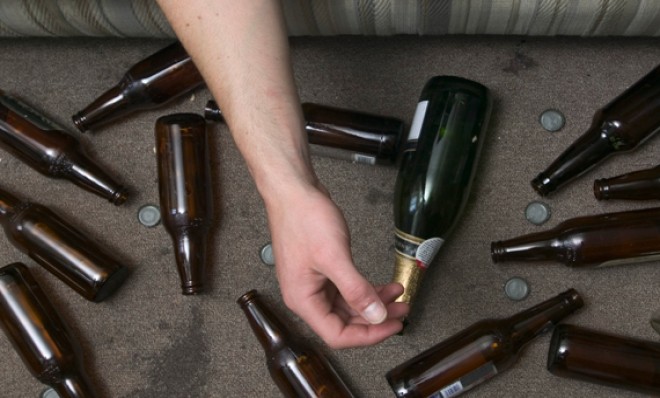Scientists want more money to research hangover cures
All of that boozing is costing us about $148 billion every year in productivity

A free daily email with the biggest news stories of the day – and the best features from TheWeek.com
You are now subscribed
Your newsletter sign-up was successful
Scientists at University of California, Davis, apparently unsatisfied with the preferred post-drinking-binge remedy of Bloody Marys and breakfast burritos, are arguing that the U.S. needs to fund more research on hangover cures.
Why? Because the "related absenteeism and poor job performance" associated with hangovers costs U.S. companies $148 billion per year, according to NBCNews.com. That comes out to about $2,000 per working adult.
Also, hangovers are terrible. "We really don't know much about a hangover and it is an incredibly puzzling response — the symptoms only show up after all the alcohol is metabolized and gone from the body," Alyson Mitchell, a professor at the department of food science and technology at UC Davis, told NBCNews.com. "The fact that something is the most toxic after it has been eliminated from the body [is unusual]."
The Week
Escape your echo chamber. Get the facts behind the news, plus analysis from multiple perspectives.

Sign up for The Week's Free Newsletters
From our morning news briefing to a weekly Good News Newsletter, get the best of The Week delivered directly to your inbox.
From our morning news briefing to a weekly Good News Newsletter, get the best of The Week delivered directly to your inbox.
While there is no magic cure for the hangover yet, science has confirmed that eating a pepperoni pizza before hanging out with your bros was totally a good idea:
Prior to drinking, people should eat a high fat meal, something that includes olive oil, meat, or dairy. The fat coats the stomach, meaning it takes the body longer to absorb the alcohol. The day after drinking, eating eggs helps replace cysteine, an amino acid lost from alcohol consumption. Our bodies don't easily replenish the amino acid, and cysteine-rich eggs help restore it. [NBCNews.com]
The reason that hangovers aren't as fun as, say, The Hangover, is that alcohol is a diuretic — as is caffeine, which is one of many reasons you should never, ever drink a vodka and Red Bull. That's also why drinking a glass of water with each alcoholic beverage can help prevent future pain.
Mitchell is so committed to preventing that pain and stopping your mornings from feeling like hell on earth that she put her scientific mind to the task of finding the perfect hangover food. What she found was yakamein, a Chinese-influenced noodle soup that is especially popular in New Orleans, according to The Atlantic:
The big bowl of liquid is loaded with sodium to replace all the salts that your body whizzes away due to alcohol's diuretic properties. The unctuous brisket sits in your stomach like a heavy sponge, slowing down the body's absorption of alcohol. The B-complex vitamins in the green onions might help ease an impending headache by preventing an accumulation of glutaric acid. That egg plays a part, too, being full of a chemical called cysteine that removes noxious acetaldehyde from the system. [The Atlantic]
As tasty as that sounds, people might be better off if they could just pop an anti-hangover pill on their way to work. (Or maybe if they drank a little less.) We say if Obama can commit $100 million to map to human brain, perhaps he can commit a tiny bit of research money to make our brains not feel like someone's stabbing them with an ice pick after having one too many.
A free daily email with the biggest news stories of the day – and the best features from TheWeek.com
Keith Wagstaff is a staff writer at TheWeek.com covering politics and current events. He has previously written for such publications as TIME, Details, VICE, and the Village Voice.
-
 How the FCC’s ‘equal time’ rule works
How the FCC’s ‘equal time’ rule worksIn the Spotlight The law is at the heart of the Colbert-CBS conflict
-
 What is the endgame in the DHS shutdown?
What is the endgame in the DHS shutdown?Today’s Big Question Democrats want to rein in ICE’s immigration crackdown
-
 ‘Poor time management isn’t just an inconvenience’
‘Poor time management isn’t just an inconvenience’Instant Opinion Opinion, comment and editorials of the day